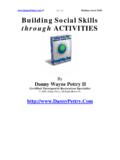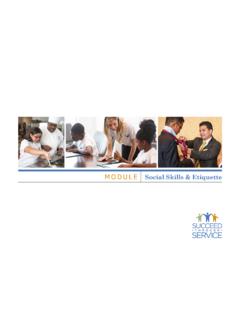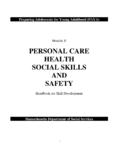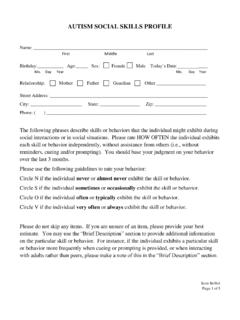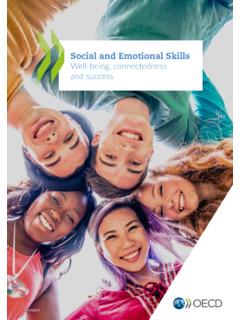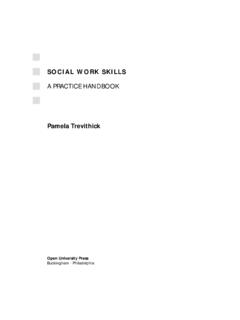Transcription of What Are Social Skills? - LDABC
1 what Are Social skills ? Social skills are the skills we use in every environment that includes two or more people. They include such things as manners and reading and reacting appropriately in ' Social environments'. Being able to read Social cues is probably the most important skill we need as almost every environment we are in is a Social environment. Many children with LD and/or ADD/ADHD have a Social disability in that they are unable to read the ' Social cues' of the many environments of which they are part ~ family, school, recreational activities, etc. If they are lacking in these skills , they are often labeled as being Social misfits, loners or having behavior problems. This disability can cause far more challenges for them than the academic difficulties they may have because academic problems can be dealt with by remediation, calculators, computers, taped materials, etc.
2 Also, this lack of Social awareness creates problems that quickly destroy their self-worth as they are seen as being different or 'weird' by their peers, and therefore, have few or no friends or the wrong kind of friend. As with the disabilities that affect their academic achievement the ' Social skills ' must be taught, practiced and sometimes even over learned. Not all children pick-up the Social nuances by being exposed to parents or others who have developed good Social skills . Some of the most important ' Social skills ' needed to survive in our world include: 1. Listening skills The ability to sit and listen to people around you. This skill is imperative for school, recreational activities and employment. With this comes the ability to follow directions, a difficulty for many children.
3 To help your child learn these skills : a) use a timer to have them sit for a short period of time and then build the time up slowly, b) start by giving two directions at a time and then increasing them when they have become proficient, c) have the child repeat back the directions so you are sure they have processed the information. 2. skills for Social acceptance These include manners ~ please, thank-you, answering the door, answering the phone, asking for help. Role playing can be beneficial in helping the child know what to expect, how to react and be accepted in new Social situations. 3. skills for dealing with anger (your own and others) This includes teaching children that it is okay to be angry, but it is not okay to speak or act violently because you are angry.
4 They also need to be taught how to deal with others who are angry so as not to make the situation worse. Some steps to help teach this skill are to teach them to walk away from the situation, count to ten and return to the situation when he/she or the other person has calmed down. 4. skills for dealing with your feelings Teaching children that we all have feelings and our feelings are always changing. It is important to be able to express our feelings so others know how we are feeling. However, the way in which we express our feelings must also be appropriate. For example, feeling angry but not acting or speaking violently, or feeling happy but not laughing too loudly at inappropriate times. It is also important that children learn to read others' feelings so they can act appropriately and avoid embarrasing or difficult situations.
5 Children need to be taught to recognize the way to read peoples' feelings ~ body language and facial expressions. 5. skills for thinking before acting Many children with LD and/or ADHD speak or act impulsively which tends to get them into difficult situations with their peers and adults. They need to be taught to stop, think about what they are going to say or do, and then make the right decision as how to go about it. A good way to teach these skills is to role play different situations the child may encounter and how they should deal with the situation. 6. skills for accepting consequences Teach children that when they do make a mistake they must accept the consequences for their actions or words. Parents frequently want to protect their children from negative actions by others, but when the child is wrong they need to admit it and face the consequences.
6 7. skills for dealing with peer pressure Many children with LD and/or ADD/ADHD will do what others ask them to do, even when they know it is wrong, thinking it will make people like them. We need to teach them not to succumb to peer pressure by saying 'NO' in a polite way. This also gives the child a sense of control as they are in charge of their own actions and words. 8. skills to improve self-image Parents can help their child improve his/her self-image by focusing on the positive. Help your child discover the things that they are 'good' at (their strengths - playing the piano, art, sports, etc.) and make that your main focus. Children with LD and/or ADD/ADHD often are more focused on the disability and have difficulty realizing all the things they do well.
7 9. skills for problem solving Teach your child how to solve interpersonal problems by modeling the skill for them using everyday examples in your home ( We have a very busy week coming up and we need to decide how we can all cooperate to get all the jobs done and everyone where they need to be. Let's brainstorm some solutions to this problem). All of these skills will help the child become a better advocate for themselves. You cannot advocate for yourself if you do not feel you are worthy or if you cannot read the ' Social climate' whether it be with a teacher, a parent, a coach, or an employer. By Barb Bidaux, Sakatchewan, Social skills Workshop facilitator and co-author of skills 4 Success Making Friends Do s and Don ts To be a good friend a child must be able to consistently be flexible, sensitive, responsive, be able to read Social situations, take a joke, etc.
8 Often kids with LDs are very concrete thinkers, which makes them inflexible and get them into more conflicts with their classmates, siblings, families. To be able to effectively join in a Social group a child must be able to read and interpret the clues of how best to join in. The child will also need the: Ability to establish & maintain friendships Ability to resolve conflicts Ability to pay attention to Social skills How can parents help? Listen, acknowledge and validate your child s feelings even the difficult ones! Create a home atmosphere that is tolerant and accepting Use structure for daily routines Consistency in discipline Appropriate expectations Support & Reassurance When children/adolescents know that it is okay to feel things and can communicate these feelings it boosts their self-esteem.
9 Recognize that impulsivity and distractibility may look like the child is not interested, being rude etc. While these are serious issues that must be addressed it is important to try and not take them would be similar to getting upset with a child with epilepsy for having a seizure but not giving them their medicine or taking them to the can t ignore the symptom of the disorder (the seizure) but you must treat the cause if you want to ever be able to control the disorder itself. Social skills Do s 1. Of course, you can t teach/discuss other ways of doing things in times of stress for example if you re child is going to a birthday party next week and they are anxious about it practice the week before how to hand over their gift to the birthday boy and how to accept the treat bag doing it beforehand will be better than in the car on the way to the party when nerves will be running high.
10 2. Show genuine interest in what the child does ask questions, take time to learn more! 3. Other suggestions: Behaviour that receives attention will likely be repeated Positive feedback can change behaviour Logical consequences can change behaviour Clear expectations, rules and limits Viable and frequent choices can minimize power struggles Proactive rather than Reactive Role model the expected behaviour and Social skills Reinforcers can be very effective catch a child being good and give them praise and reward them in the act of being good rather than the incentive approach which rarely works. Social skills Don t 1. The sink or swim approach often doesn t work enrolling your child in various activities such as scouts or soccer where they will have to interact with others to succeed often is not successful always your child is extremely skilled at something more allowances are made, certain activities lend themselves better than others but generally without certain adaptations put into place it is likely that if your child has Social skills deficits they will struggle in all Social settings.
